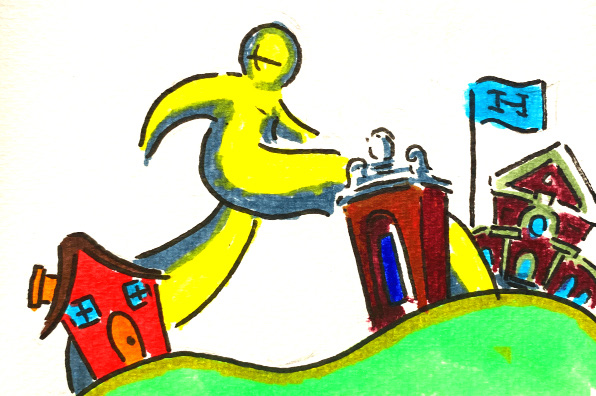While I was watching fireworks back home in Hong Kong on Chinese New Year, it occurred to me that life resembles that spectacle—you pay a lot of money for a short period of noise and then nothing.
Growing up, the older people in my life created many expectations for me. I needed to get good grades, go to an esteemed college, and find a well-paying job. My peers and I accepted these goals as the necessary checkpoints on the journey to happiness.
From a societal standpoint, this perspective on happiness is valid—happiness comes from greater achievements. However, from the perspective of an individual’s pursuit of happiness, this isn’t true. Following the fulfillment of each goal, and a brief moment of happiness, a new demand rises and, with that, the pursuit of the next objective.
For me, this was defined by my family’s hope that I would get into Hotchkiss. I accepted that goal. I spent the entirety of my ninth-grade fall and winter applying to boarding schools. I thought that at the end of those nine months of writing essays, doing interviews, calling coaches, and waiting for decisions I would be happy.
In one way, I was right. March 10, 2023—the day I was accepted into Hotchkiss—was the happiest day of my life. I went out for dinner with my family, called friends, and stayed up all night, thinking about the endeavors I’d undertake at my new school.
But what I forgot was the original reason that I wanted to be at boarding school. I was so focused on the outcome that it overshadowed everything beyond it.
Yes, getting into Hotchkiss brought me and my family happiness, but it also increased our woes. My dad had to work harder to send me to school, my mum had to deal with my absence from our household three years prematurely, and I had to deal with the fact that there was a new expectation for me—be better.
This year’s Nalen lecturer, Dr. Priscilla Gilman, told us that this is known as the hedonic treadmill—the fact that humans rapidly adjust to new circumstances and return to a relatively stable level of happiness.
The hedonic treadmill describes our tendency to take for granted what we have already gained. It locks us in a cycle of constantly pursuing, but never arriving. By fleeing from the present, we fail to see the opportunities for happiness in front of our eyes.
I realized that by constantly pursuing the next achievement, I was voluntarily hopping on the hedonic treadmill. Each accomplishment is but a firework—a temporary flare of delight that quickly fades into the darkness of normality. My desire for the next triumph blinded me to the wonders of the present.
We fail to recognize that happiness exists in the basic elements of our days. It’s the little things in our days that make life worth living. Happiness comes from time spent with loved ones, simple pleasures, and practicing gratitude. True contentment lies not in striving for constant exceptional moments, but in finding fulfillment in the ordinary.
After the bright sparks of the fireworks light up the night sky, their brilliance fades away. Each achievement or peak emotional high will invariably dim and dissolve.
The wisdom of Robert Frost holds true: “So dawn goes down to day, nothing gold can stay.” But don’t worry—true happiness lies not only in the golden moments, but in the small, simple joys we share each day with our loved ones. That is happiness.





